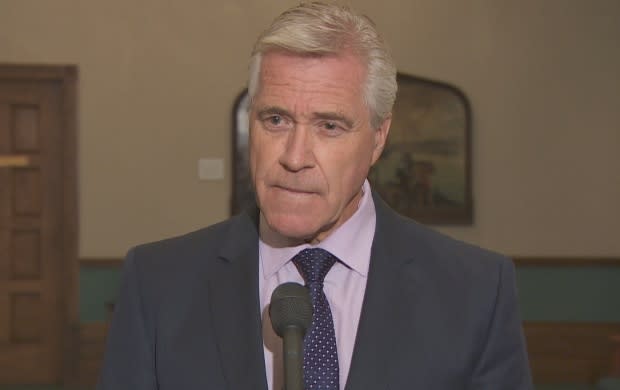Site where 2.6M salmon died won't resume operations until province satisfied: Ball
Premier Dwight Ball says the aquaculture company that owns the pens where 2.6 million fish died on Newfoundland's south coast won't get its licences back until the province is satisfied salmon farming can be done sustainably.
"When we get an understanding that we can go back and fish can be harvested, farmed in that area, but do it in an environmentally sustainable way and to be successful, it is then that the licences will be restored so that the company can get back to work employing Newfoundlanders and Labradorians," the premier told reporters Tuesday.
Northern Harvest Sea Farms — a subsidiary of Norwegian aquaculture giant Mowi — says the die-off, which it reported to the provincial government Sept. 3, was caused by warmer than normal water temperatures, which lowered oxygen levels in the pens on Newfoundland's south coast.
But it would be another three weeks before the deaths were made public, announced by the Fish Food & Allied Workers' union, which said the die-off raises questions about the viability of the aquaculture industry.
"There was lots of room for communications improvement through this whole process. We've made that quite clear that the company needed to do a better job in communicating with the people in that area and with government," Ball said.
"This should have never happened."
CBC News sent reporters to the scene in Fortune Bay in early October but were denied a request to tour the site by Northern Harvest Sea Farms.
Fisheries and Land Resources Minister Gerry Byrne, through media relations manager Linda Skinner, has consistently refused CBC's requests for an interview, starting Oct 11, the day he announced the suspension of all affected Northern Harvest Sea Farms licences after the salmon were confirmed dead.
You don't want the company recommending someone to do that investigation. It's just an extension of self-regulation. - Bill Montevecchi
Skinner has said some of that time he has been travelling, but other times has simply said he is unavailable.
Ball said he is meeting with Byrne on Thursday for an update.
"What we need to do is work with the industry leaders to make sure this doesn't happen again," said the premier. If that means regulatory changes, he said, the province is prepared to work with the Newfoundland Aquaculture Industry Association on those changes.
"We will get the regulations in place to make sure this doesn't happen again," he said.
Concerns about oversight
Bill Montevecchi, a professor of biology and ocean sciences at Memorial University, told CBC Radio's Newfoundland Morning that the way the salmon die-off was handled raises concerns about oversight and regulation.
"We have government agencies that are responsible for that, but when you see what has happened and what has unfolded it is clear that the government agencies have given away that responsibility to the industry," he said, comparing the system of self-reporting and self-regulating to the province's offshore oil and gas industry.

Montevecchi also questioned the planning that went into the Fortune Bay salmon operation, saying it was already known that ocean water is getting warmer. He also wonders if the salmon pens were overstocked.
"Did they plan ahead for any of that? Maybe they should have had the fish at lower densities. What actually happened, in my understanding of the situation, is the water on the surface gets warm, and it's such a horrible death — the fish go down and actually crush and suffocate the fish that are lower down," Montevecchi said.
"Certainly you don't want the company recommending someone to do that investigation. It's just an extension of self-regulation."
Read more from CBC Newfoundland and Labrador

